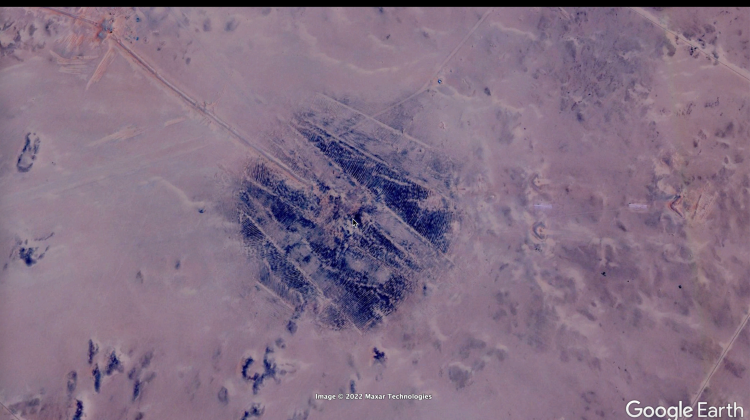Aga Khan Program Lecture: Against the Regime of Emptiness

The trace of the explosion of France’s first nuclear bomb in the ground zero, the Algerian Sahara © 2022 Maxar Technologies.
Samia Henni
Cornell University
Via zoom only. Register here
Aga Khan Program Lectures and Events
Abstract: The territories of both hot and cold deserts embody various forms of anthropogenic exploitation, such as colonial dispossession, resource extraction, and civil and military occupation. And yet, among the most common platitudes about the desert are ideas that “deserts are empty,” that “the desert is absent of life,” or that “there is nothing at all in the desert.” This misleading conceptualization of the desert has served to legitimize its transformation, manipulation, toxification, and destruction. This stereotype was, for instance, the justification offered by the French army to defend its choice to use the Algerian Sahara—then a French colonized territory—as the firing field for France’s first atomic bombs between 1960 and 1966. According to General Charles Ailleret, the head of France’s nuclear program, the Sahara was “a land of thirst and fear, from which all life was reputedly absent,” the designated desert characterized by “the total absence of animal and vegetal lives.” Contrary to this colonial invention, this lecture aims at tracing and naming the spatial, atmospheric, and geological impacts of France’s atomic bombs in the Sahara. It demonstrates how the imposed “regime of emptiness” enabled the French authorities to “fill” the Algerian desert with radioactive architecture and wastes.
Bio: Samia Henni is a historian and an exhibition maker of the built, destroyed, and imagined environments. She is the author of the multi-award-winning Architecture of Counterrevolution: The French Army in Northern Algeria (gta Verlag, 2017, EN; Editions B42, 2019, FR), the editor of War Zones, gta papers no. 2 (gta Verlag, 2018), and Deserts Are Not Empty (Columbia Books on Architecture and the City, 2022). She is the maker of the exhibitions Archives: Secret-Défense (ifa Gallery, SAVVY Contemporary, Berlin, 2021), Housing Pharmacology / Right to Housing (Manifesta 13, Marseille, 2020) and Discreet Violence: Architecture and the French War in Algeria (Zurich, Rotterdam, Berlin, Johannesburg, Paris, Prague, Ithaca, Philadelphia, Charlottesville, 2017–21). She teaches history of architecture and urban development at Cornell University's College of Architecture, Art and Planning. Currently, she is working on a commissioned exhibition project, titled Performing Colonial Toxicity (2023), with If I Can't Dance I Dont't Want to be Part of Your Revolution and Framer Framed in Amsterdam; and a book projec, titled Colonial Toxicity: French Nuclear Architecture and Wastes in the Sahara (2024), which investigates France’s nuclear weapons program and its aftermath in the Algerian Sahara.


